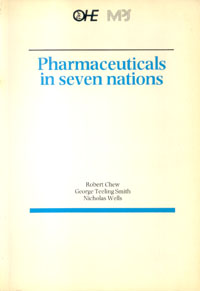Great Britain at the suggestion of and in close collaboration with Medizinisch Pharmazeutische Studiengesellschaft (MPS) in the Federal Republic of Germany, OHE is funded entirely by…
Great Britain at the suggestion of and in close collaboration with Medizinisch Pharmazeutische Studiengesellschaft (MPS) in the Federal Republic of Germany, OHE is funded entirely by the Association of the British Pharmaceutical Industry and MPS by seven research-based companies in Germany. The Report…
Great Britain at the suggestion of and in close collaboration with Medizinisch Pharmazeutische Studiengesellschaft (MPS) in the Federal Republic of Germany, OHE is funded entirely by the Association of the British Pharmaceutical Industry and MPS by seven research-based companies in Germany. The Report describes the modern research-based pharmaceutical industry, with particular reference to its structure and activities in seven countries – the Federal Republic of Germany, France, Italy, Japan, Switzerland, the United Kingdom and the United States. The reason for the choice of these seven countries, which account for three-quarters of world pharmaceutical production, will become obvious in reading the Report.
The Report, which draws heavily on the findings of a special questionnaire survey conducted by OHE, discusses the performance of the pharmaceutical industry, its contribution to national well-being in both social and economic terms and the factors which have been responsible for its success. It is particularly topical because the industry is under scrutiny and attack by both national governments and international agencies in many parts of the world. The industry is also subject to criticism by consumerist groups, which often do not recognise its achievements. Nor do they understand the conditions which are necessary for the pharmaceutical industry to continue to make a positive contribution to society in the future.
The pharmaceutical industry is characteristic of a small group of high technology industries which are becoming increasingly important to the economic prosperity of the advanced nations of the world.1 These industries need political understanding if they are to make their full contribution to the health and to the well-being of the countries in which they are based. They cannot flourish if they are enmeshed in deliberately hostile constraints.
In recent months pharmaceutical industries have too often been attacked for their profitable success. If these attacks were to continue, particularly in Europe, the prosperity from these high technology industries could be seriously endangered. International competition in and between these industries is strong and vigorous. But if the consumerist criticisms of them lead to punitive government regulation – as seems to be happening particularly in the United Kingdom – the appropriate international competitive environment will be destroyed. As a result, the potential improvements in the quality of life from high technology – that is, from pharmaceutical research – will be endangered.
The Report deliberately concentrates on the problems and performance of the pharmaceutical industry in advanced countries. The quite different 1 For further discussion of this issue the reader’s attention is drawn to Pharmaceuticals among problems of supplying medicines to the Third World have been extensively discussed elsewhere (see, for example, Medicines, Health and the Poor World published by OHE in 1982) and fall outside the scope of this particular Report. Similarly, no reference is made to the substantial contribution of the pharmaceutical industry to animal health and well-being. Instead the analysis concentrates on the social and economic factors concerned with human medicines. The hope of the authors is that those who read this Report will have a clearer idea of the value of the pharmaceutical industry to those nations which have fostered its growth and prosperity. In consequence, they hope to persuade national governments and international agencies to look favourably on the pharmaceutical industry, and to maintain policies which will allow the industry to make an even greater social and economic contribution in the future.
